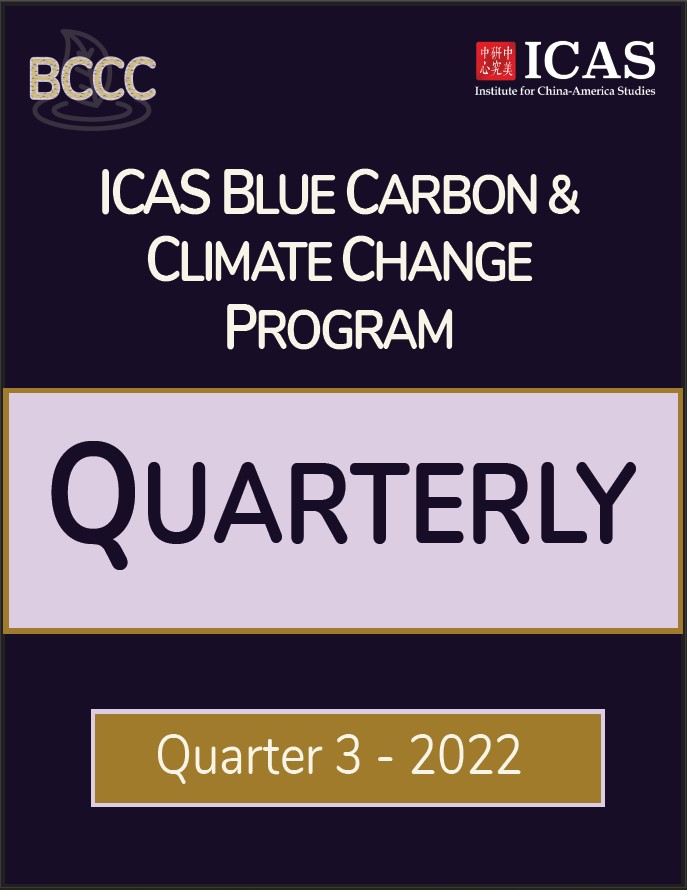
ICAS Bulletin (online ISSN 2836-3418, print ISSN 2836-340X) is published every other week throughout the year at 1919 M St NW, Suite 310, Washington, DC 20036.
The online version of ICAS Bulletin can be found at chinaus-icas.org/bulletins/.

– The United States and 14 Pacific Island nations signed a partnership agreement at a summit in Washington for climate change, economic growth and stronger security ties in the latest U.S. bid to counter Chinese influence.
– China’s ambassador to the U.S. Qin Gang spoke out against his country’s responsibility for America’s opioid crisis and blamed sanctions for hampering cooperation. In an interview, Gang said “[b]laming China is not a constructive way to address the fentanyl crisis.”
– China dismissed complaints from two U.S. Congressmen over the quarantining of American diplomats and their family members. U.S. officials confirmed 16 U.S. diplomats have been involuntarily held in quarantine camps and subjected to strict confinement measures with no definitive release date.
– The U.S. Ambassador to China Nicholas Burns in a message recently continued to urge China to resume talks as the ramification for House Speaker Nancy Pelosi’s trip to Taiwan halted dialogues. Burns continued to say that Beijing is “endangering a peaceful resolution to tensions in the Taiwan Strait” as well as the “U.S. is not seeking to decouple, but will ‘vigorously’ compete.”
– U.S. Vice President Kamala Harris, while aboard a naval destroyer in Japan, criticized China’s recent actions as “disturbing behavior” and that the U.S. would deepen ties with Taiwan.
Associated News References:
“Countering China, the U.S. Signs a Broad Deal to Aid Pacific Nations,” The New York Times, September 30 [Paywall]
“Don’t blame China for US opioid crisis, says ambassador Qin Gang,” South China Morning Post, September 30 [Paywall]
“China dismisses complaints over quarantining US diplomats,” ABC News, September 30
“US Urges China to Resume Talks Ended After Pelosi Went to Taiwan,” Bloomberg, September 29 [Paywall]
“Beijing endangering peace with Taiwan ‘overreaction’, US ambassador says,” South China Morning Post, September 29 [Paywall]
“Kamala Harris Criticizes China’s ‘Disturbing Behavior,’ Provocations Toward Taiwan,” The Wall Street Journal, September 28 [Paywall]

– China Satellite Communications, which the U.S. has sanctioned and placed off-limits to American investors, is now preparing a private placement of up to 400 million new shares and has opened a bank account for the expected funds.
– The U.S. has begun regulatory inspections of audits from Chinese companies listed in the U.S. The China-U.S. audit agreement, passed in August, allows U.S. regulators, for the first time, to inspect China-based accounting firms.
– The Biden administration is expected to announce new measures to restrict Chinese companies’ access to technologies that enable high-performance computing. The measure’s goal is aimed at hindering Beijing’s ambitions to craft next-generation weapons and automate large-scale surveillance systems.
– As China’s Covid Zero strategy remains firmly in place, investors are anticipating little relief as Chinese stocks in the U.S. are set to register their worst month in more than a year. Heavyweights such as Alibaba Group Holding, JD.com, and Baidu have all lost more than 16%.
– Chinese semiconductor start-ups are rushing to fill the vacuum created after the U.S. restricted the export of advanced chips from Nvidia Corp and Advanced Micro Devices (AMD) to China. Analysts expect that Chinese chip companies still lag far behind Nvidia.
Associated News References:
“China’s military companies tap new investors after U.S. sanctions,” Nikkei Asia, October 5
“U.S. inspections of China corporate audits at ‘very early stage,’ PwC says,” Reuters, October 4 [Paywall]
“U.S. Said to Plan New Limits on China’s A.I. and Supercomputing Firms,” The New York Times, October 3 [Paywall]
“China’s Stocks in US See No Relief in September,” Bloomberg, September 30 [Paywall]
“China chip start-ups rush to tout AI chip breakthroughs after Nvidia sales ban,” South China Morning Post, September 29 [Paywall]

– The FBI released an assessment regarding how Chinese government-affiliated operatives and organizations are promoting misinformation on the integrity of upcoming midterms.
– Hacks conducted by Chinese affiliated entities are reported to be surging by PricewaterhouseCoopers (PwC). Chinese groups tracked by PwC have targeted dozens of American organizations in the last year, including government agencies and technology firms.
– After China’s request, Moderna Inc. refused to hand over to China the intellectual property behind the development of its COVID-19 vaccine, which has since led to a collapse in negotiations to sell it in the Chinese market.
– On September 19, while on a routine patrol, USCGC Kimball encountered a joint Russian Navy-People’s Liberation Army Navy Surface operating in the U.S. exclusive economic zone approximately 75 nautical miles north of Kiska Island, Alaska.
– The Chinese military recently held a major exercise utilizing large civilian ferries to launch a massive amphibious invasion.
Associated News References:
“Russia and China are promoting US voting misinformation ahead of midterms, FBI warns,” CNN, October 3
“Chinese hacking group targeting US agencies and companies has surged its activity, analysis finds,” CNN, October 2
“Moderna refused China request to reveal vaccine technology, Financial Times reports,” Reuters, October 2 [Paywall]
“Reagan Strike Group Starts Drills with Korean Navy; Russian, Chinese Ships Spotted off Alaska,” USNI News, September 27
“Chinese Launch Assault Craft from Civilian Car Ferries in Mass Amphibious Invasion Drill, Satellite Photos Show,” USNI News, September 28

– Boeing, which has failed to sign a major plane deal with China since 2017, failed to secure a 40-plane deal this September. The missed opportunity comes as China ordered nearly 300 Airbus aircraft worth about $37 billion with China’s big three state-owned carriers.
– Chinese pharmaceutical companies and biotech firms are expected to face new regulatory hurdles in conducting acquisitions in the U.S. due to a new executive order from the Biden administration.
– Chief executive Simon Yang, who has headed YMTC—China’s largest producer of memory chips—since its founding in 2016, stepped down to deputy chairman as the company faces mounting pressure with potential U.S. sanctions on the way.
– China’s first narrow-body jet has cleared a major regulatory hurdle to begin carrying passengers. China’s leader Xi Jinping met with a team behind the C919 project.
– Apple has begun to manufacture iPhone 14 series in India instead of China with its new production line in Chennai beginning operation. The move is part of a plan to disentangle its manufacturing operations from the Chinese state.
Associated News References:
“Boeing’s China Orders Dry Up on US Tensions in Boost for Airbus,” Bloomberg, October 5 [Paywall]
“Greater US scrutiny to hurt Chinese pharmaceutical firms’ expansion plans,” South China Morning Post, October 2 [Paywall]
“China’s top memory chip maker replaces CEO amid US sanctions risk,” South China Morning Post, October 1 [Paywall]
“China’s Challenger to Boeing and Airbus Clears Major Hurdle,” The Wall Street Journal, September 30 [Paywall]
“Apple shifts some iPhone 14 production from China to India,” The Guardian, September 27

– Adm. Samuel Paparo, commander of the U.S. Pacific Fleet, during Secretary of Defense Austin’s visit to Hawaii spoke on the capability of the U.S. and its allies to break a maritime blockade of Taiwan. Paparo expressed confidence that Washington could do so on its own, but with its allies the “the answer to that is a resounding yes.”
– American officials have intensified efforts to build up Taiwan’s weapon stockpile and “porcupine” it with enough weapons to hold out if the Chinese military blockades and invades it. It comes as after studying recent naval and air force exercises by the Chinese military around the island.
– The militaries of the U.S. and the Philippines recently launched a two week joint naval exercise. It comes at a time of regional uncertainty between the U.S. and China.
– Secretary of Defense Austin recently refused to directly endorse President Joe Biden’s statement that the U.S. military would defend Taiwan if China invaded, instead reiterating that America’s priority is helping Taiwan protect itself.
– A bipartisan team of 15 senators are seeking to create a commission tasked with creating a “grand strategy” that avoids conflict with China while allowing the U.S. freedom to pursue its interests. The senators hope to file the bill as an amendment to the National Defense Authorization Act.
– The U.S. Navy is seeking to deploy extra-large underwater drones that can conduct both offensive and intelligence-gathering activities at a lower cost relative to conventional submarines. Secretary of Defense Austin was briefed on the current status of such developments at the Naval Information Warfare Center Pacific in San Diego.
Associated News References:
“U.S. could break Chinese blockade of Taiwan: Navy commander,” Nikkei Asia, October 5
“U.S. Aims to Turn Taiwan Into Giant Weapons Depot,” The New York Times, October 5 [Paywall]
“Philippines and U.S. kick off naval exercises amid China tension,” Reuters, October 3 [Paywall]
“Austin stops short of endorsing Biden’s vow to defend Taiwan,” Politico, October 2
“Senators propose ‘China Grand Strategy’ commission to guide US policy,” Defense News, September 30
“U.S. doubles down on extra-large drone subs to counter China,” Nikkei Asia, September 29

“GOP vow intense China focus if they flip the House,” Politico, October 6
“Pentagon adds drone maker DJI to blacklist it links to China’s military,” South China Morning Post, October 5 [Paywall]
“China Is Rerouting U.S. Liquefied Natural Gas to Europe at a Big Profit,” The Wall Street Journal, October 3 [Paywall]
“US-China tech war weighs on Xi Jinping’s legacy ahead of 20th party congress,” South China Morning Post, October 3 [Paywall]
“Japan grants Micron $320mn in deepening US chip alliance,” Financial Times, September 30 [Paywall]
“Latest Push by Chinese Firms to Avoid Delistings Falls Short,” Bloomberg, September 29 [Paywall]
“Anti-Asian hate crimes are scaring Chinese travelers away from the US,” CNN, September 30
“The U.S. and EU brace for Xi Jinping’s third-term challenge,” Politico, September 29
“UK, U.S. trade officials discuss challenges posed by China,” Reuters, September 29 [Paywall]
“US imposes oil sanctions against Chinese companies accused of aiding Iran,” The Hill, September 29
“WSJ News Exclusive | Chinese Company Aims to Sell 3 U.S. Resorts for $1.3 Billion,” The Wall Street Journal, September 28 [Paywall]
October 6 hosted by USCBC
October 7 hosted by Hudson Institute
October 11 hosted by Hudson Institute
October 11 hosted by Center for Strategic and International Studies
October 14 hosted by Center for Strategic and International Studies
October 14 hosted by Center for Strategic and International Studies
October 13 hosted by East-West Center
October 12 hosted by Walsh School of Foreign Service

Prospects of Climate Policies and Cooperation: The Expectations of COP 27
Wednesday, October 12, 2022
9:30am – 11:00am EDT
There is about one month to go to the 27th session of the Conference of the Parties (COP27) to the UNFCCC, which is set to take place in Egypt from November 7-18, 2022. The world’s climate is deteriorating at a much faster pace than expected as we experience more frequent extreme weather and natural disasters. Also, the current measures on climate change set during COP26 are far from being met. With the ambition of making this conference into “a radical turning point in international climate efforts in coordination with all parties,” COP27 seeks to find solutions to both imminent and persisting climate crises. COP27 hopes to continue the world’s efforts to reduce greenhouse gas emissions within the framework of the Paris Agreement. Meanwhile, it plans to support the climate-vulnerable countries in adapting to the unavoidable impacts of climate change. Therefore, financing and assisting developing countries that lack the monetary and technical capacities to achieve the stated goals is another essential component of COP27.
Are countries delivering on their climate protection agendas as they promised at last year’s COP26 and the Paris Agreement, which was signed almost seven years ago? What are some examples of noticeable domestic policies designed to fulfill these agreements? Are there any recent developments in or retrogressions of these policies? Is establishing international institutions to form binding powers in affecting countries’ domestic environmental policies a feasible solution? As an important topic of COP27, what are examples of practical measures in assisting developing countries to mitigate and reverse climate challenges? How do we encourage different actors to work together and consider using one another’s comparative advantages in multilateral cooperation? Considering recent downturns in both geopolitical interactions and mutual trust, how do we ensure countries pay close attention to environmental problems while not using it as a bargaining chip? Conversely, would healthy competition be a good solution to bring all major powers back to the table? Join the ICAS Blue Carbon & Climate Change Program for this event to warm up for COP27 in November.
U.S.-Pacific Island Country Summit: Geopolitics trumps development
By Sourabh Gupta
September 30, 2022
It is unsurprising that a country which boasts nearly three times as many military bases as embassies and consulates would see the signing of an agreement by a state falling within its sphere of influence with a counterpart major power through the lens of geostrategic competition. To a hammer, everything looks after all like a nail.
And so it was when the Solomon Islands signed a security cooperation agreement with China earlier this spring to permit Chinese law enforcement forces to support the Solomon Islands’ national police force to protect Chinese investment projects on the islands, as well as facilitate rest and replenishment for Chinese naval vessels at port. The agreement was smeared by Washington as an example of “chequebook diplomacy” and the replenishment facility mischaracterized as a naval base that would host a permanent military presence. It bears noting in this regard also that the Solomon Islands capital city Honiara, in November 2021, was witness to some of the worst rioting seen in many years, despite decades of (clearly sub-par) police forces training by Australia’s Regional Assistance Mission to Solomon Islands (RAMSI) under the Solomon Islands-Australia security treaty…
Protecting Blue Carbon From Extreme Weather’s Destruction and For Its Mitigation
By Zhangchen Wang
October 3, 2022
The Summer of 2022, with frequent cases of extreme weather conditions around the globe, has finally come to an end as the temperature drops and the floods begin to recede across the world. With extensive reports and analyses covering the significant casualties and economic losses it has caused, extreme weather has proven its power again to everyone. Just like the damages it brought to global markets and societies, extreme conditions can be equally devastating to blue carbon ecosystems. Leaving droughts, storms, floods, and other natural disasters to ruin blue carbon sinks will only worsen climate problems and cause irreversible damage. Blue carbon plays an important role in improving climate challenges so it is essential to make sure the blue carbon sinks—like mangroves, sea grasses, krill, and salt marshes—survive extreme weather cases. Maybe in the near future, a more healthy and mature blue carbon ecosystem can even, in turn, contribute to further improving climatic conditions.
Although blue carbon sink degradation is mostly caused by direct human activities such as industrial pollutants, upstream dams, and dredging, climate change’s impacts still should never be discounted as unimportant. There are many studies discussing the vulnerability of blue carbon to climate change, and it is even considered as a factor that affects the reliability of carbon accounting for blue carbon. Both short-term extreme events (like storms and drought) and long-term climatic changes (such as marine heatwaves and sea levels rising) bring existential threats to the blue carbon ecosystem. Episodic extreme high temperatures—in other words, short but unbearably hot summers—can bring lethal consequences to seagrasses. Mangroves might be more resilient to high temperatures in comparison, but they still cannot survive if heat causes drought. Wind and waves brought by climate change may pose a direct threat to the blue carbon ecosystem by physically damaging or even destroying them. Thus, if we leave extreme weather to wreak havoc, the future outlook for healthy blue carbon sinks will be more and more pessimistic…

Explore the Newly Designed ICAS BCCC Program Quarterly Newsletter!
Released the first week of every new quarter, the BCCC Quarterly is a magazine-style newsletter that records the most important trends and developments regarding blue carbon and climate change policies and regulations in China, the U.S., and other regions, as well as international regimes such as the United Nations. It also includes two special sections — the ‘Theme of the Quarter’ and the ‘Blue Carbon Country Profile’ — that aim to bring a fresh element to each issue.
Other New Additions to the BCCC Quarterly Include:
– Theme of the Quarter –
2022 Q3: Global Extreme Weather
By Zhangchen Wang
Despite how slowly the climate change and blue carbon field evolves, both in the private and public sectors, there will inevitably be an identifiable trend of interest across a three month period. Thus, every quarter the ICAS Team will identify and summarize a major trend or long-term topic of interest relevant to the most recent quarter.
In addition to collections of relevant news summaries, government actions and statements, and scientific research activities, the theme includes an analytical commentary from our researchers on how this theme relates to other present-day developments, policy interests, climate change and environment concerns, and implications for the blue carbon field.
– Blue Carbon Country Profile –
2022 Q3: The United States
By Amanda Jin
Given how ‘blue carbon’ is a relatively new subject to both scientists and policymakers, the ICAS Team wants to provide a collective view on how individual nations are recognizing, analyzing, and applying blue carbon at all levels of the government, through cross-border and international engagements, and in private sector and non-profit activities.
This profile is also intended to identify places that are in need of particular attention. It will conclude with issues that interested parties should pay attention to in the coming months and years, including areas that need improvement, potentials worth exploring as well as possibilities of bilateral and multilateral cooperation in both policymaking and scientific exploration.
The Philippines under Marcos Jr: Playing the US card to deal with China
By Rommel Banlaoi
October 3, 2022
After his six-day trip from 19-25 September 2022, President Ferdinand “Bong Bong” Marcos, Jr. returned to the Philippines from New York City where he spoke at the 77th General Assembly of the United Nations, delivered speeches in various forums, and met President Joe Biden. His trip to the US provided a window of opportunities for President Marcos Jr. to enunciate at the international stage his administration’s foreign policy of being “friend to all and enemy to none”.
This foreign policy articulation is a familiar line obviously taken from his predecessor, President Rodrigo R. Duterte. But compared with President Duterte who made a paradigm shift to China to challenge the US, President Marcos Jr. took a different approach by playing the US card to deal with China.
In his brief but substantive face-to-face meeting with President Biden, President Marcos Jr. candidly stressed, “We have always considered the United States our partner, our ally, and our friend” arguing that “We continue to look to the United States for that continuing partnership and the maintenance of peace in our region”. He also underscored that “the role of the United States in maintaining the peace in our region is something that is much appreciated by all the countries in the regions and the Philippines especially.”
How will China Respond to the ROK-US EDSCG Meeting?
By Capt. Sukjoon Yoon, ret.
September 25, 2022
The United States and South Korea held the third meeting of the Extended Deterrence Strategy and Consultation Group (EDSCG), on September 16, 2022 in Washington. Attending for the ROK were First Vice Minister for Foreign Affairs Cho Hyun-dong and ROK Vice Minister of National Defense Shin Beom-chul, and for the US Under Secretary of State for Arms Control and International Security Affairs Bonnie Jenkins and Under Secretary of Defense for Policy Colin Kahl.
The EDSCG, a high-level consultation mechanism established in October 2016, last met in January 2018 in response to the sixth North Korean nuclear test. This third meeting was requested by the new ROK administration for a comprehensive discussion of strategy and policy issues pertaining to the Korean Peninsula, and with a view to enhancing the effectiveness of the ROK-US alliance.
Previously, at their summit meeting on May 21, 2022, US President Joe Biden and newly-elected ROK President Yoon Suk-yeol had committed the alliance to extended deterrence. President Yoon, from the political right-wing, takes a very different view of the geopolitical situation than his predecessor, Moon Jae-in: Yoon considers Moon’s policies toward North Korea and China to have been much too soft, and he now seeks to “repair” the ROK-US alliance and wants an unequivocal North Korean commitment to denuclearization.

On Sunday, September 27, 2022, Senior Fellow Sourabh Gupta discussed Chinese Foreign Minister Wang Yi’s speech at the UN General Assembly
On Monday, September 29, 2022, Senior Fellow Sourabh Gupta was quoted by South China Morning Post on the goals of the US-Pacific Islands Summit
On Tuesday, October 4, 2022, Senior Fellow Sourabh Gupta was interviewed about the Ukraine conflict and US-Russia relations on RT Worlds Apart
On Thursday, October 6, 2022, Senior Fellow Sourabh Gupta discussed China’s role in global peace and security on CGTN’s Global Thinkers

The Institute for China-America Studies is an independent nonprofit, nonpartisan research organization dedicated to strengthening the understanding of U.S.-China relations through expert analysis and practical policy solutions.
1919 M St. NW Suite 310,
Washington, DC 20036
icas@chinaus-icas.org
(202) 968-0595
© 2025 INSTITUTE FOR CHINA-AMERICA STUDIES. ALL RIGHTS RESERVED.